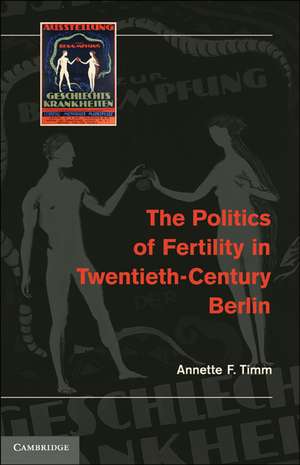The Politics of Fertility in Twentieth-Century Berlin
Autor Annette F. Timmen Limba Engleză Hardback – 29 aug 2010
Preț: 757.52 lei
Preț vechi: 880.83 lei
-14% Nou
Puncte Express: 1136
Preț estimativ în valută:
144.95€ • 151.72$ • 120.65£
144.95€ • 151.72$ • 120.65£
Carte tipărită la comandă
Livrare economică 31 martie-14 aprilie
Preluare comenzi: 021 569.72.76
Specificații
ISBN-13: 9780521195393
ISBN-10: 052119539X
Pagini: 374
Ilustrații: 14 b/w illus. 1 map
Dimensiuni: 165 x 242 x 25 mm
Greutate: 0.68 kg
Editura: Cambridge University Press
Colecția Cambridge University Press
Locul publicării:New York, United States
ISBN-10: 052119539X
Pagini: 374
Ilustrații: 14 b/w illus. 1 map
Dimensiuni: 165 x 242 x 25 mm
Greutate: 0.68 kg
Editura: Cambridge University Press
Colecția Cambridge University Press
Locul publicării:New York, United States
Cuprins
Introduction: birth rates, ideology, and sexual duties; 1. Venereal disease and the crisis of sexuality in the Weimar Republic; 2. Marriage counseling in the Weimar Republic; 3. Nazi Bevölkerungspolitik, health, and the family; 4. Venereal disease control in the Nazi era; 5. Controlling venereal disease in four-power Berlin; 6. Counseling couples in the post-war rubble; 7. Guarding the health of workers and families in the German Democratic Republic; 8. Sexual duties in Cold-War West Germany; Conclusion: the end of sexual duty and the future of Bevölkerungspolitik.
Recenzii
'Timm presents a nuanced and convincing argument on the basis of extensive research, yielding new and important insights. The scope and focus of this book should certainly generate fruitful discussion.' Edward Dickinson, University of California, Davis
'Timm has written an ambitious and important book. Meticulously researched and theoretically informed, The Politics of Fertility tells the story of the delicate, politicized, and thus unstable balance between sexual duties and sexual rights. Despite its broad chronological reach, it never retreats into generalization or a 'top-down' approach. Instead, it turns an astute eye to popular desires and demands at the local level. And its contemporary relevance will not be lost on anyone attuned to reproductive politics today.' Elizabeth Heineman, University of Iowa, and author of the forthcoming Before Porn Was Legal: The Erotica Empire of Beate Uhse
'What is sex for? How do states intervene in citizens' most private moments and how do public health authorities reconcile their own obsessions with 'eugenic responsibility' and demographic management with citizens' more inchoate, elemental longings for happier coupling - and this across four very different ideological regimes? Timm's imaginative, deeply researched study offers a wealth of riveting and thought-provoking detail and a magnificent fresh perspective on the unexpected continuities and counterintuitive subtle shifts in twentieth-century German population politics. The book provides a gold mine of insights for transnationally comparative histories of sexuality.' Dagmar Herzog, Graduate Center, City University of New York
'This complex exploration of Berlin's efforts to combat VD and offer marriage counseling argues that the rhetoric of 'sexual duty' served as a basis for German citizenship across four different regimes in the twentieth century. The author offers an innovative interpretation of population policy as an 'inclusionary racism' that attempted to increase fertility through a sense of national responsibility, supplemented by incentives of the welfare state.' Konrad Jarausch, University of North Carolina, Chapel Hill
'Timm has written an ambitious and important book. Meticulously researched and theoretically informed, The Politics of Fertility tells the story of the delicate, politicized, and thus unstable balance between sexual duties and sexual rights. Despite its broad chronological reach, it never retreats into generalization or a 'top-down' approach. Instead, it turns an astute eye to popular desires and demands at the local level. And its contemporary relevance will not be lost on anyone attuned to reproductive politics today.' Elizabeth Heineman, University of Iowa, and author of the forthcoming Before Porn Was Legal: The Erotica Empire of Beate Uhse
'What is sex for? How do states intervene in citizens' most private moments and how do public health authorities reconcile their own obsessions with 'eugenic responsibility' and demographic management with citizens' more inchoate, elemental longings for happier coupling - and this across four very different ideological regimes? Timm's imaginative, deeply researched study offers a wealth of riveting and thought-provoking detail and a magnificent fresh perspective on the unexpected continuities and counterintuitive subtle shifts in twentieth-century German population politics. The book provides a gold mine of insights for transnationally comparative histories of sexuality.' Dagmar Herzog, Graduate Center, City University of New York
'This complex exploration of Berlin's efforts to combat VD and offer marriage counseling argues that the rhetoric of 'sexual duty' served as a basis for German citizenship across four different regimes in the twentieth century. The author offers an innovative interpretation of population policy as an 'inclusionary racism' that attempted to increase fertility through a sense of national responsibility, supplemented by incentives of the welfare state.' Konrad Jarausch, University of North Carolina, Chapel Hill
Notă biografică
Descriere
How a declining population influenced reproductive and sexual health policy in Germany.













